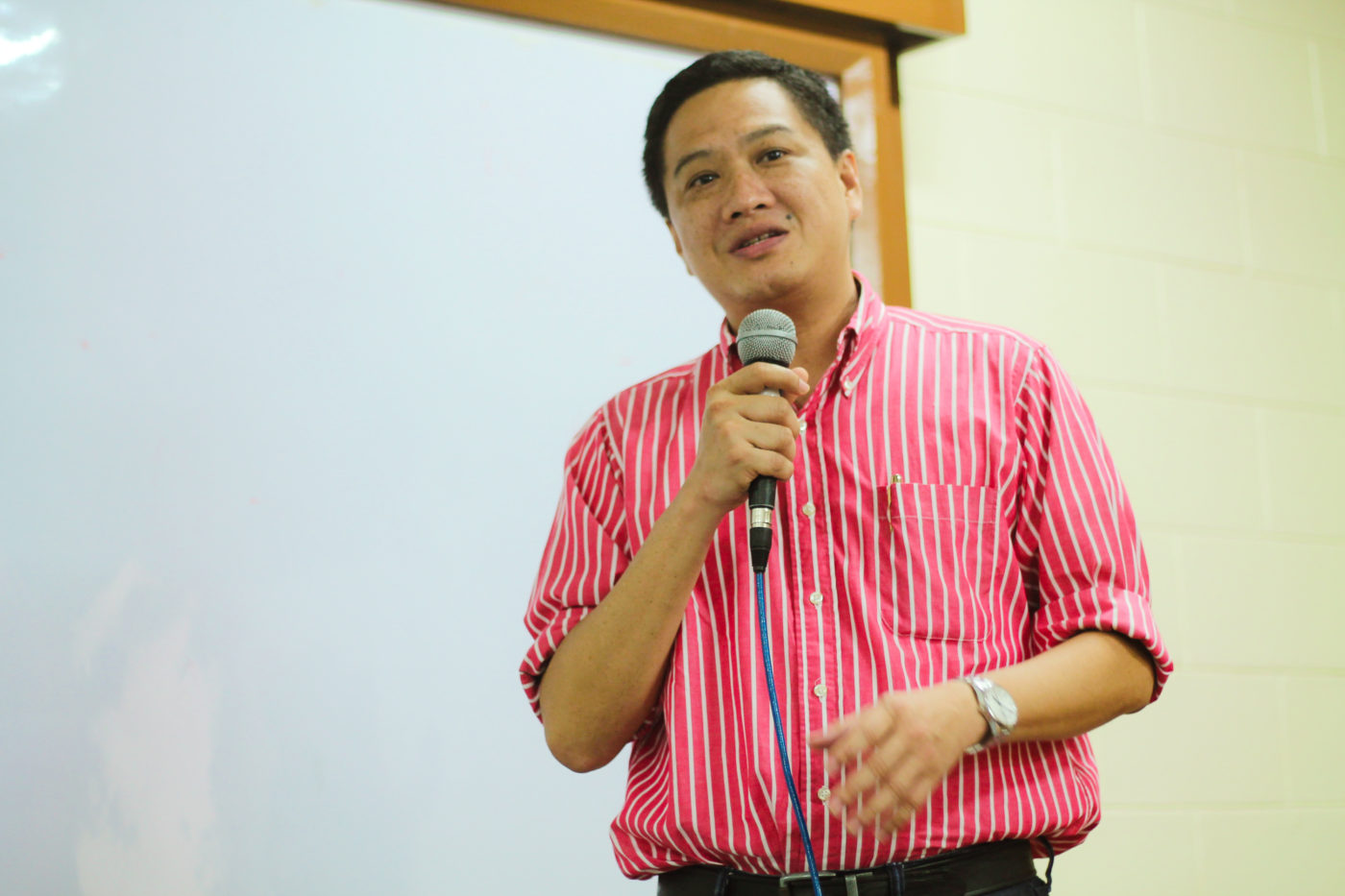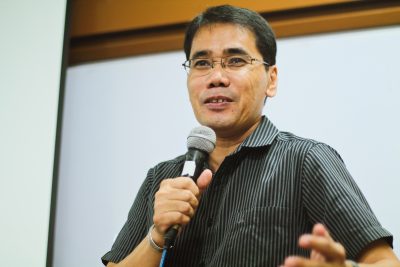RESOURCE SPEAKERS discussed the history and necessity of the Freedom of Information (FOI) bill in a talk held last September 12 in Bellarmine 313. Sanggunian officials attended the event.
According to Sanggunian President Dan Remo, the talk was meant to give the members of the Sanggunian, particularly the block and course representatives, “as much information and as much of the necessary tools” as possible in fulfilling their duties as Sanggunian officers.
The speakers were former Quezon Congressman Lorenzo “Erin” Tañada and Right to Know, Right Now Coalition Lead Convener Atty. Nepo Malaluan.
Right to Know, Right Now Coalition is the group that filed a people’s version of the FOI bill in the 16th Congress via indirect initiative last July 1.
The talk was part of the Tatak Sanggu Series. According to the Sanggunian’s Department of External Affairs Chairman Jeric Abesamis, the talks aim to raise social awareness among members of the Ateneo community as well as empower block and course representatives by training them in core competencies.
For this phase of the series, the core competency to be developed among the officers was sociopolitical awareness.
The next phase of the series is a planning session that will determine appropriate action points for the Sanggunian with regard to the FOI. This is scheduled for next semester.
The FOI bill seeks to provide guidelines for citizen access to government records and files.
History of FOI
During the talk, Tañada gave a brief overview of the history and current status of the FOI bill.
According to Tañada, “Muling nabuhay ang FOI. Kung hindi dahil sa pork barrel [scam], baka hindi na muling napag-usapan (Interest in the FOI has been revived. If it weren’t for the pork barrel scam, it may not have been talked about again).”
He explained that he “inherited” the FOI bill from the 11th Congress of 1998 to 2001, adding that “nothing happened” with regard to bill until 2007.
The Congress’ Public Information Committee started working on the bill in October 2007. It was later passed by the House of Representatives in May 2008.
However, Tañada said that the bill then faced delays because the 2008 Senate committee head for Public Information was Senator Bong Revilla, who repeatedly postponed committee hearings regarding the bill.
Tañada speculated that the importance of the FOI bill might have been “beyond the grasp” of Revilla.
However, a reshuffling of the Senate committee heads last December 2008 resulted in Senator Alan Peter Cayetano replacing Revilla. Cayetano pushed for the passage of the bill until it was approved in the Bicameral Conference.
At this stage, the Senate was ratified the bill but the Congress did not.
In order for the FOI bill to become a law, it must be first submitted to the Senate or to the Congress. After three readings and a majority vote in the house that it was filed in, the bill is transmitted to the other house to undergo another three readings and a majority vote.
Discrepancies between the two houses’ versions of the bill are settled in a bicameral conference. The approved bill is then passed to the President for final approval.
Why pass the FOI bill?
Malaluan, on the other hand, talked about the content of the FOI and how it relates to the rights of citizens as stated in the 1987 Constitution.
He divided his talk into four parts: The framework of the FOI bill, its content, what is at stake and its current status.
Malauan said that the framework of the FOI is based on the social contract in which citizens entrust the government with vast authorities and resources with the expectation that the government will act in their favor.
He explained that there is always a “danger of abuse” in this contract, but the citizens are given “protection” through Section 7 of the Bill of Rights.
This section states that the government shall recognize the right of the citizens to access official records and other relevant documents pertaining to official transactions and decisions, as well as government research data as basis for policy development.
According to Malaluan, abuses may arise if the government tries “to operationalize” the citizens’ right to access government records and documents because of concerns over confidentiality, scope of which documents can be requested and procedure and sanctions for refusing to disclose information.
These concerns are what the FOI bill aims to solve.
Malaluan cited the Priority Development Assistance Fund (PDAF) scandal as an example of why the country needs the FOI bill passed.
Though the Department of Budget and Management (DBM) regularly publishes information about the government’s finances, these are not enough for the citizen’s to investigate how Janet Lim-Napoles, who is allegedly behind the PDAF scandal, was able to obtain the PDAF of several government officials.
The aggregate data provided to the public by DBM does not contain necessary documents for the citizens to help prevent the abuse of government resources.
Politicizing Ateneo
The Tatak Sanggu talk was in line with a particular goal of Sanggunian President Remo’s term: To politicize the Ateneo community.
“We have [a] responsibility to really bring nationwide issues into the campus,” Remo said.
However, the Ateneo Assembly Executive Director for Research and Advocacy Exequiel Salcedo observed certain faults in the Sanggunian’s previous efforts in bringing national issues into the campus.
“While there were efforts and initiatives that attempted to rally Atenean support for FOI, there were not enough follow-throughs which ought to sustain the hype, which is perhaps the more challenging task,” said Salcedo.
However, he supports the Sanggunian’s current efforts to engage the students in discussions regarding the FOI bill.
Salcedo suggested that the Sanggunian open its planning sessions to other groups and individuals outside of the student government.
As for capturing the interest of the students, Salcedo said that education about the FOI bill issue has the potential to engage the students.
“It (education) allows them (students) to realize that they are indeed stakeholders in this issue, therefore it is only right for them to be involved,” he added.
- Photo by Lj V. Miranda.
- Photo by Lj V. Miranda.
- Photo by Lj V. Miranda.
- Photo by Lj V. Miranda.
- Photo by Lj V. Miranda.












